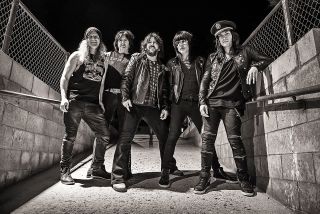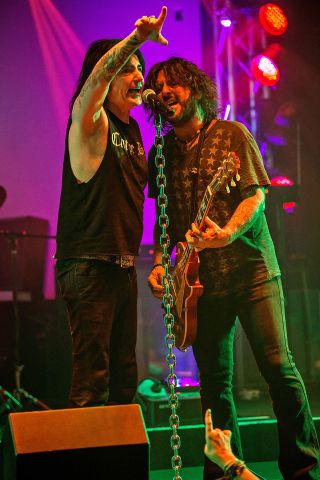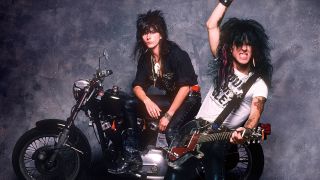If you’d called a psychic telephone hotline in Los Angeles in the late 1990s, there’s a chance you might have heard Phil Lewis on the other end. The British-born singer was on one of his periodic stints out of L.A. Guns, the band he had joined a decade or so earlier after relocating to California, when a friend asked if he fancied making some easy money. ‘Why not?’ he thought. The fact he knew absolutely nothing about astrology wasn’t an issue. It was just a matter of keeping the gullible rubes who called the premium-rate number on the line for as long as possible.
“I was recording a solo album at the time, and I had my baby girl in the other room, watching her on a video monitor,” says Lewis now. “Every now and then the phone would go, this three ring alarm, which indicated it would be from the psychic hotline. It was real basic psychology. Even though I knew nothing, I was pretty bloody good at it: ‘You’re Leo, Asparagus rising,’ you know.”
Amazingly, his shtick worked. But guilt quickly crept in. “The people who were calling weren’t too bright,” he says ruefully. “I felt like I was exploiting them. I stopped after a couple of weeks.”
Lewis was no Mystic Meg. Yet even if he had been, it’s unlikely he’d have been able to guess the wayward course L.A. Guns would plot over the next 20 years. The band may have helped usher in the Sunset Strip scene of the 1980s, but their career since then has been defined by fallings out, departures, firings and a bitter schism between Lewis and founding guitarist Tracii Guns.
For much of this century, there have been two different versions of L.A. Guns doing the rounds. One consisted of Lewis, long-time drummer Steve Riley and a rotating cast of hired hands, makeweights and ringers. The other was steered by Guns himself and featured, well, much the same. The two versions spent more than a decade warily circling each other, lobbing the occasional barb via the media. This wasn’t the Wagnerian drama of Guns N’ Roses, a band that Tracii Guns himself had co-founded back in the depths of the 1980s. This was a pair of pissed-up old street corner hookers screaming insults at each other from across the road.
And that’s how things looked like continuing until someone – anyone – keeled over and died. But then just under two years ago, Lewis and Guns patched things up. That was hardly front-page news . What takes it beyond the usual clichés is that the album the retooled and recharged L.A. Guns have just put out, the winkingly titled The Missing Peace, is one of the most potent hard rock records of recent months.
“Phil and I never had a problem with each other, it was always people around us,” says Tracii Guns. “But we were always surrounded by drama. It’s finally time to put that drama to bed.”

Guns himself is the first to admit that his band were never Sunset Strip A-listers in the way that Mötley Crüe or GN’R were. Even at their commercial peak, around the time of their second album, 1989’s Cocked And Loaded, L.A. Around theat time the band were playing to two or three thousand people a night. “After the first six hundred people it’s all the same anyway,” he says modestly (a polite and self-effacing man, he does ‘modest’ well).
Guns himself wasn’t just there at the birth of the glam metal scene, he predates it. Unlike all those arrivistes that followed, he’s Los Angeles through and through. As a kid, he loved rock’n’roll – Aerosmith, Led Zeppelin, the Eagles, Elton John. One of his best friends at junior high school was a curly-haired kid called Saul Hudson – later to rechristen himself Slash. “We’d walk to school every day, having these really combative discussions about music – what was cool, what was not,” he says. “Being really competitive with each other, but loving each other at the same time.”
He was barely 17 when he put the first incarnation of L.A. Guns together in 1983 – not old enough to drink legally (he was never a big drinker anyway). Mötley Crüe had become the first band from that scene to break big nationally, and everyone wanted a piece of their action. L.A. Guns were no different.
“We were packing out shows right away,” he says. “That felt great, to look out into the crowd at the Troubadour and see David Lee Roth or Nikki Sixx standing there. That was the addiction. Still is.”
L.A. Guns shared bills with other similarly hungry hopefuls: WASP, Poison, Hollywood Rose, the latter fronted by a red-haired wildcat calling himself Axl Rose. Tracii initially met Axl via Hollywood Rose guitarist Izzy Stradlin’, who was crashing at Guns’ mom’s house. “I’ll never forget watching Axl walk up to the microphone for the first time in soundcheck,” he says. “He opened his mouth and I was, like, ‘Holy shit, who is this guy?’”
Within a year, L.A. Guns had merged with another local band, Hollywood Rose, and combined their names: Guns N’ Roses. The two who shared the driving seat became tight friends.
“Me and Axl were faux-homeless,” says Guns. “We had places to stay, but we fancied being out on the street, hanging out and taking in Hollywood together. It was a great experience and there was no downside.” He laughs. “Except when it came to a head and we had a disagreement. And that was the end of me being in Guns N’ Roses.”
Guns was too ambitious to quit now, and he reactivated L.A. Guns. Their early years were a struggle, but given that Los Angeles was rapidly becoming the epicentre of the music industry, not that much of a struggle. The main obstacle appeared to be certain members of the band themselves.
‘We were at a signing meeting with this label, and the A&R guy goes to our singer at the time, ‘Hey buddy, whaddya want to get out of this as career?’” he recalls, “and the guy just nodded forward. He was strung out on heroin.”
The hapless frontman was promptly dispatched, leaving the door open for the man who would help take L.A. Guns to the next level.
He may have spent 30 years living in Los Angeles, but Phil Lewis could still pass himself off as minor member of the British aristocracy, at least vocally. His precise consonants and easy manner are a world away from the transatlantic drawl he deploys on record. That’s what a good private school education buys you.
He’s also a lot more reserved than his image as a louche, leather-trousered eternal brat would suggest, though he’s always friendly. “The first time I met Phil, he was sat at a table in the Cat And Fiddle pub in Hollywood, hiding behind some sunglasses, shy as you can be,” Guns says of his bandmate. “He’s a loner in a lot of ways, always looking to be accepted.”
But Lewis has more miles on the rock’n’roll clock than many of his contemporaries. In the late 70s, he was the singer in Girl, the London sleaze rockers whose influence on the LA bands that followed half a decade later has never been credited in full. After that band collapsed in on itself, he joined Tormé, the group put together by journeyman guitarist Bernie Tormé, only to find that band stymied by mass public disinterest.
“Things weren’t going terribly well in the old country,” he says now. “Tormé were tearing it up every night and we couldn’t get arrested. Rock’n’roll was just a filthy term for the labels back then. Everybody wanted fucking Buck’s Fizz back then. Plus I had a few personal issues for the ladies. It was a good time for Scotty to beam me up.”
Lewis was vaguely aware of what was happening in Los Angeles – he knew people who knew people. And it was one of those people, an ex-pat Welshman named Alan Jones, who would be key in bringing him over. When Jones called Lewis to see if fancied joining a band he was managing named L.A. Guns, the singer didn’t have to think twice.
“I went, ‘Is tomorrow alright?’” he says. “It had been raining in London for twenty-eight straight days. The day I left, it was still raining. They picked me up at the airport in a jeep. I was laying in the back, looking up at the palm trees. I was, like, ‘Yeah, this is going to work.’”
Lewis’ ‘audition’ basically amounted to him saying “one-two” into a microphone, such was Guns’ belief in the man he’d only met a matter of hours before. Hands were shaken, agreements were made. And then they floored the pedal.
L.A. Guns’ self-titled debut album came out in 1988. If they were behind the curve compared to some of their peers, then they quickly made up for it. Songs like One More Reason and Sex Action became MTV staples. They looked like as much as a band: with their uniform black leather jackets, black T-shirts, dyed black hair, this was The Wild Ones: The Heavy Metal Years.
“They put us in that fucking hair metal band category, but we weren’t,” says Lewis with barely concealed distaste. “We were a dirty, greasy biker band – a real biker band. As opposed to the other bands at the time, who were all tits and teeth, doing goofy shit.”
The debut album performed well – upwards of half a million sales. The second album, Cocked And Loaded, fared even better, passing the million-selling platinum mark. They found themselves swarmed with hangers-on and new friends. Some of this was good – everyone likes to be popular. Some of it less so. “When you’ve got the fucking publicist’s girlfriend choosing your single, you know something’s not right,” says Lewis.
But costs were spiralling – the singer talks about “the million dollar budget” for their third album, Hollywood Vampires – and sales weren’t keeping up. Suddenly, the hangers-on vanished, drawn away by other, more fashionable bands.
But changing trends were the least of their problems. A bigger issue was that Lewis and Guns were pulling in different directions. The guitarist wanted to heavy the band up, bring them closer to prevailing early 90s trends. Lewis was still hoisting the sleazy rock’n’roll flag high. Things became strained, and then untenable – it wasn’t so much the record industry that did for L.A. Guns as L.A. Guns themselves.
“The whole thing was a claustrophobic situation,” says Lewis. “It was awful, incredibly toxic. It certainly didn’t help the relationship between him and me.”
In hindsight, it sounds like a storm in a teacup but at the time it was enough for Lewis to bail. He left after 1994’s Vicious Circle, replaced by a long-forgotten singer named Chris Van Dahl.
That’s when things got confusing.

There’s little point trying to detail how many people have passed through L.A. Guns over the years. “Oh, maybe forty,” says Lewis, laughing. But the late 90s was an especially turbulent time, with musicians hopping in and out of the band like fleas on a mangy dog. Future Steel Panther frontman Ralph ‘Michael Starr’ Seanz briefly joined, as did Love/Hate’s Jizzy Pearl, Bang Tango’s Joe Lesté, Faster Pussycat guitarist Brent Muscat and even former WASP man Chris Holmes. It was less a band, more a halfway house for struggling hair-metal musicians.
“Oh, it damaged the L.A. Guns brand undoubtedly,” says Guns, who kept the flag flying during the late 90s. “I talked myself into things I probably shouldn’t have done. If Pavarotti had come along and offered to sing Sex Action, I’d have probably said, ‘Yeah, you’re in.’”
Not that Lewis’ own solo career was in rude health. As well as taking a job as an amateur psychic, he worked as an assistant for a stage hypnotist (“I was doing the sound while he got people to pretend to be chickens”). Inevitably, the offer to reunite with his old band in 1999 was hard to resist. And that’s when things got really confusing.
In 2002, it was Guns’ turn to leave. Offered a spot in Crüe bassist’s Nikki Sixx’s LA supergroup Brides Of Destruction, he deserted the band he’d formed. Talking about it now, it’s the only time Phil Lewis sounds annoyed.
“We’d just done a really good record together (2002’s Waking The Dead), but he was going in a different direction,” says the singer. “He was frustrated, but his timing was lousy. He chose to dump the band two weeks after the record – actually, during the photo shoot for it. Nobody’s looking at each other in the photo. Everybody’s pissed off.”
Lewis and drummer Steve Riley announced that L.A. Guns would continue without Guns. And that’s what happened, at least until 2006, when Guns decided to activate his own version of the band. Suddenly, the world had two L.A. Guns at a time when, frankly, one would have been surplus to requirements.
Today, both men sound simultaneously sheepish and obstinate about the situation they found themselves in. At the time, neither was willing to back down.
“It wasn’t a difficult decision to make,” says Guns carefully, “but when a band splits in two, it instantly becomes about nostalgia: ‘Yeah, these guys are good, but they’re not those guys. It came from a lot of soul-searching.”
“Yeah, it seemed silly to the casual observer, but this is our livelihood,” says Lewis. “He had every right to start his own version, but morally, it was not a very cool thing to do. We put out three records. I didn’t get the impression that was what he wanted to do. He just wanted to go and play gigs and make money.”
Given the band’s tangled history, no one would have been surprised if one had picked up the phone to the other and said, ‘This is ridiculous, let’s get back together.’ Except the phone call never happened. And it kept never happening.
Both incarnations ploughed on, convinced that they were the real thing. Guns’ version didn’t release anything of note, content to play sporadic live dates with various singers, while the guitarist himself moonlighted in a series of other groups. But the Lewis version of the band put out a pair of creditable studio albums, 2005’s Tales From The Strip and 2012’s Hollywood Forever, both of which partied like it was 1987.
Still, the singer was becoming increasingly frustrated at the band’s situation, not least their non-existent work rate in the studio. He paints drummer Steve Riley as simultaneously controlling and disengaged. “Steve’s one of these guys who wanted to be the band manager, the band driver, the band travel agent, he wanted to do everything. Consequently, it just seemed like he was angry and tired a lot.” (CR reached out to Riley for a comment, but received no response).
But by the end of 2015, with no sign of a new album, Lewis decided he’d had enough. “I said, ‘If we’re not going to make a record and we’re on these shitty festival line-ups, I’m leaving.”
He gave a year’s notice. “We didn’t make a big announcement in the press – I mean, who cares?” he laughs. Phil Lewis was exiting L.A. Guns for the second time in his career. But like the old song says, you can check out – but you can never leave.
In reality, this Sunset Strip Cold War had shown signs of thawing a few years earlier. Lewis and Guns reunited briefly for a charity gig in Las Vegas in 2013. Publicly, both men remained stubbornly wedded to their own versions of L.A. Guns, but privately Lewis was rethinking his position.
“It got to the point where we’d been estranged for such a long time that it felt, like, ‘Why the fuck are we still fighting?’” says Lewis with a sigh. “If you hold a grudge for that long, it’s a bit like taking poison and expecting somebody else to die.”
The reunion, when it came, was oddly undramatic. In May 2016, Guns and Lewis announced that they would be playing a string of gigs at the end of the year as L.A. Guns. Next to the recent reconciliation of their old muckers Slash and Axl, this was strictly small fry. But in their own way, the pair embodied the long-vanished glamour of the 80s Hollywood scene just as much as their more famous peers.
Certainly, The Missing Peace is way better than a record released by a bunch of glam metal veterans 30 years after their heyday has any right to be. Originally planned by Guns as a solo album, it doesn’t quite erase the memory of the various indignities heaped upon the L.A. Guns name in the interim years, though razor-sharp rock’n’rollers It’s All The Same To Me and Speed go some way to making reparations.
Of course, L.A. Guns being L.A. Guns, neither man is willing to bet their house on what the future holds – something past experience suggests is wise. “As long as we can keep our heads about us, this band definitely has a future,” says Guns. He shuts down the suggestion that Steve Riley still has his own version of L.A. Guns with a polite but curt: “I don’t think so.” (He won’t to be drawn into the specifics of any issues with his former drummer.)
The unpredictability of the situation suits them – this is a band who have spent the last 30 years in a permanent state of volatility, after all. But there’s one question that remains unanswered: is this Phil Lewis’ L.A. Guns featuring Tracii Guns, or is it Tracii Guns’ L.A. Guns featuring Phil Lewis?
The guitarist grins. “It’s L.A. Guns, baby.”
The Missing Peace is out now via Frontiers.


